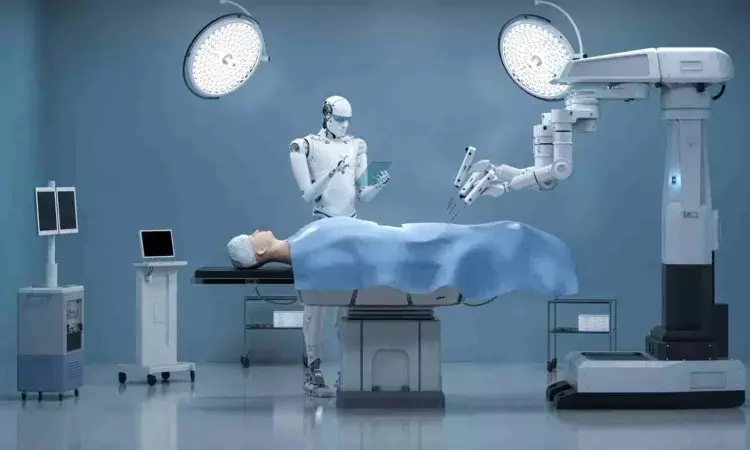- Home
- Medical news & Guidelines
- Anesthesiology
- Cardiology and CTVS
- Critical Care
- Dentistry
- Dermatology
- Diabetes and Endocrinology
- ENT
- Gastroenterology
- Medicine
- Nephrology
- Neurology
- Obstretics-Gynaecology
- Oncology
- Ophthalmology
- Orthopaedics
- Pediatrics-Neonatology
- Psychiatry
- Pulmonology
- Radiology
- Surgery
- Urology
- Laboratory Medicine
- Diet
- Nursing
- Paramedical
- Physiotherapy
- Health news
- Fact Check
- Bone Health Fact Check
- Brain Health Fact Check
- Cancer Related Fact Check
- Child Care Fact Check
- Dental and oral health fact check
- Diabetes and metabolic health fact check
- Diet and Nutrition Fact Check
- Eye and ENT Care Fact Check
- Fitness fact check
- Gut health fact check
- Heart health fact check
- Kidney health fact check
- Medical education fact check
- Men's health fact check
- Respiratory fact check
- Skin and hair care fact check
- Vaccine and Immunization fact check
- Women's health fact check
- AYUSH
- State News
- Andaman and Nicobar Islands
- Andhra Pradesh
- Arunachal Pradesh
- Assam
- Bihar
- Chandigarh
- Chattisgarh
- Dadra and Nagar Haveli
- Daman and Diu
- Delhi
- Goa
- Gujarat
- Haryana
- Himachal Pradesh
- Jammu & Kashmir
- Jharkhand
- Karnataka
- Kerala
- Ladakh
- Lakshadweep
- Madhya Pradesh
- Maharashtra
- Manipur
- Meghalaya
- Mizoram
- Nagaland
- Odisha
- Puducherry
- Punjab
- Rajasthan
- Sikkim
- Tamil Nadu
- Telangana
- Tripura
- Uttar Pradesh
- Uttrakhand
- West Bengal
- Medical Education
- Industry
Robotic Thymectomy Matches VATS in Long-Term Outcomes, Excels in Perioperative Results: Study

Robotic surgery
Researchers have found that robotic-assisted thoracoscopic surgery (RATS) thymectomy delivers outstanding perioperative outcomes with equivalent long-term oncological outcomes when compared to video-assisted thoracoscopic surgery (VATS) in treating thymic epithelial tumors. A recent study was conducted by Long-Fei and colleagues which was published in the journal BMC Surgery.
The study involved an analysis of data from 180 patients who underwent thymectomy through RATS or VATS between July 2016 and December 2019. Of these, 85 patients were operated on by RATS, and 95 patients were operated on by VATS. To allow for balanced comparisons, the analysis was done with a 1:1 propensity score-matched approach. The analysis was focused on perioperative factors, including operation time, blood loss, and conversion rates to open surgery, and long-term oncological outcomes, such as 5-year progression-free survival and tumor-related survival rates.
Key Results
Perioperative Outcomes:
• Operation Time: The median operation time was significantly shorter in the RATS group, 100 minutes, compared to the VATS group, 120 minutes (p = 0.039).
• Blood Loss: The patients in the RATS group had less blood loss with a median of 40.00 ml compared to the VATS group, 50.00 ml (p= 0.011).
• Conversion Rates: Conversion to open surgery was remarkably less in the RATS group with only 2 patients (3.03%) compared with 10 patients (15.15%) in the VATS group (p= 0.030).
Late Oncological Outcomes :
Progression-Free Survival
• The 5-year progression-free survival rate was found out to be 87.70% in the RATS group which is equal to the overall percentage of the VATS group.
• Tumor-Related Survival: The 5-year tumor-related survival rate for the RATS group was 92.31%, without any statistical significance when compared with the VATS group.
RATS thymectomy resulted in excellent perioperative outcomes and long-term oncologic results compared with VATS. Based on these data, RATS can be considered as an effective and efficient alternative to VATS for thymic epithelial tumor treatment. Due to the possibility of combining the perioperative advantages with reliable long-term results, RATS will have an important position in the surgical treatment of thymic malignancies.
Reference:
Zhu, L.-F., Zhang, L.-M., Zuo, C.-J., Jiang, B., & Cheng, N. (2024). Long‐term outcomes of robot versus video-assisted thymectomy for thymic epithelial tumors: a propensity matched analysis. BMC Surgery, 24(1). https://doi.org/10.1186/s12893-024-02661-3
Dr Riya Dave has completed dentistry from Gujarat University in 2022. She is a dentist and accomplished medical and scientific writer known for her commitment to bridging the gap between clinical expertise and accessible healthcare information. She has been actively involved in writing blogs related to health and wellness.
Dr Kamal Kant Kohli-MBBS, DTCD- a chest specialist with more than 30 years of practice and a flair for writing clinical articles, Dr Kamal Kant Kohli joined Medical Dialogues as a Chief Editor of Medical News. Besides writing articles, as an editor, he proofreads and verifies all the medical content published on Medical Dialogues including those coming from journals, studies,medical conferences,guidelines etc. Email: drkohli@medicaldialogues.in. Contact no. 011-43720751


